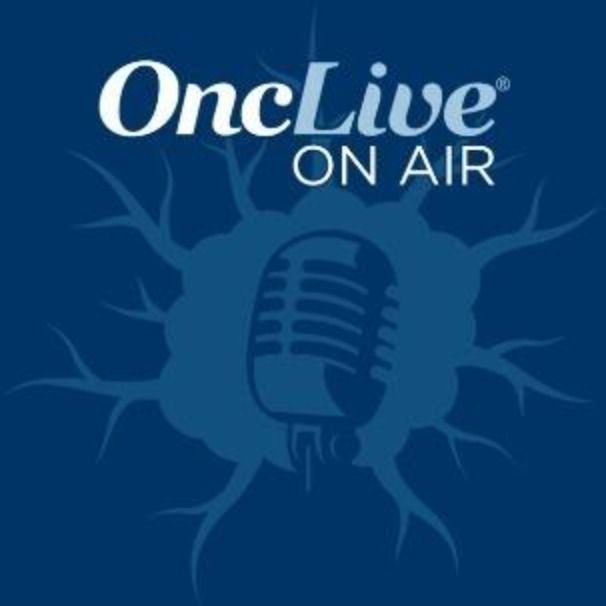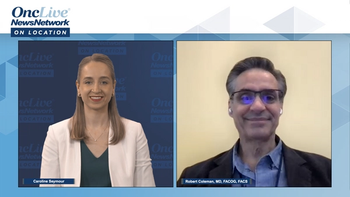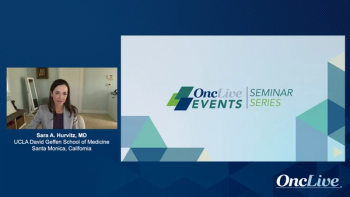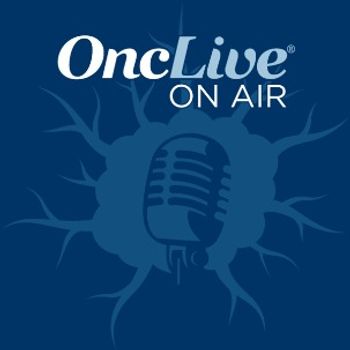
Breast Cancer
Latest News

Latest Videos

CME Content
More News

Highlights of the results from the DESTINY-Breast03 and HER2CLIMB trials, evaluating T-DXd and tucatinib, respectively, in HER2+ metastatic breast cancer.

Overall survival outcomes for patients with hormone receptor–positive, HER2-negative advanced breast cancer who had dose modifications of ribociclib in the phase 3 MONALEESA-2 trial were comparable to those seen among patients who received the standard dose.

Radiotherapy can safely be omitted from treatment plans following breast conserving surgery without jeopardizing recurrence rates for patients aged 55 years and older who have low-grade, T1N0, luminal A breast cancer with a Ki67 expression of 13.25% or less, according to findings from the LUMINA study.

OncLive® will be LIVE with OncLive® News Network: On Location at the 2022 ASCO Annual Meeting. Each day, we will broadcast a series of interviews with top thought leaders, to learn their thoughts and reactions to data presented across oncology during the conference.

The combination of lasofoxifene and abemaciclib provided a meaningful progression-free survival benefit and elicited encouraging responses with an acceptable toxicity profile in patients with locally advanced or metastatic estrogen receptor–positive, HER2-negative breast cancer.

Ribociclib plus an aromatase inhibitor elicited improved symptom-related quality of life outcomes compared with abemaciclib plus an aromatase inhibitor as first-line therapy in postmenopausal patients with hormone receptor–positive, HER2–negative advanced breast cancer, according to findings from a matching-adjusted indirect comparison study.

Higher treatment discontinuation rates with abemaciclib were associated with factors including age of 65 year or older, enrollment in either North America or Europe, an ECOG performance status of 1, postmenopausal status, 1 to 3 positive lymph nodes, and 4 or more preexisting comorbidities in patients with hormone receptor–positive, HER2-negative high-risk early breast cancer.

Treatment with fam-trastuzumab deruxtecan-nxki doubled progression-free survival and reduced the risk of death by 36% compared with physician's choice of chemotherapy for patients with HER2-low, hormone receptor–positive metastatic breast cancer.

Alpelisib plus fulvestrant demonstrated a clinical benefit regardless of gene mutation status in patients with hormone receptor–positive, HER2-negative advanced breast cancer, including those with FGFR1 or FGFR2 alterations.

Ribociclib plus endorcrine therapy led to a statistically significant improvement in progression-free survival in patients with hormone receptor–positive, HER2-negative unresectable or metastatic breast cancer with tumor progression following treatment with a CDK4/6 inhibitor, according to findings from the randomized phase 2 MAINTAIN trial.

First-line treatment with palbociclib plus letrozole did not elicit a significant benefit in overall survival compared with letrozole monotherapy in patients with estrogen receptor-positive/HER2-negative advanced breast cancer missing the secondary end point of the trial.

Updated data from a safety analysis of the phase 3 DESTINY-Breast03 study confirmed the tolerability of trastuzumab deruxtecan among patients with with HER2-positive unresectable or metastatic breast cancer.

Patritumab deruxtecan produced encouraging responses in patients with HER3-expressing metastatic breast cancer or metastatic triple negative breast cancer.

Sacituzumab govitecan elicited a statistically significant and clinically meaningful benefit among patients with hormone receptor–positive, HER2-negative breast cancer with endocrine therapy resistance, reducing the risk of disease progression by 34% vs standard chemotherapy, according to results of the phase 3 TROPiCS-02 trial.

For the 10th consecutive year, OncLive® is honored to recognize oncology leaders whose innovations have contributed to immeasurable improvements in outcomes for countless patients.

Naomi Dempsey, MD, discusses the role of de-escalation therapy in early-stage, HER2-positive breast cancer and provides highlights from ongoing clinical trials in the space.

Heather McArthur, MD, MPH, described how the data from DESTINY-Breast03 reshapes the treatment landscape and offers added benefit to patients with brain metastases.

Joyce O'Shaughnessy, MD, and Sara Hurvitz, MD, consider how they would approach the treatment of a patient with HER2+ metastatic breast cancer.

Centering discussion on a real-world patient profile, subject matter experts discuss use of the HER2CLIMB regimen in HER2+ breast cancer.

Considerations for the role of trastuzumab emtansine in HER2+ breast cancer with the advent of newer HER2-targeted therapies.

Expert perspectives on adjuvant and neoadjuvant use of pembrolizumab in the KEYNOTE-522 study in triple-negative breast cancer.

Present in approximately two-thirds of estrogen receptor-positive breast cancers, the role of ESR1 mutations in disease metastasis is poorly defined.

Paolo Tarantino, MD, discusses the importance of the phase 3 DESTINY-Breast04 trial in HER2-low breast cancer.

Black patients were less likely to be included in clinical trials that investigate newer treatments for metastatic breast cancer, despite having the highest death rate and shortest survival outcomes when compared with other racial and ethnic groups in the United States.

Dr Tarantino provides background on the categorization of HER2-low disease in breast cancer, issues with standardization and interpretation, historical management strategies, and ongoing research with agents including trastuzumab deruxtecan, trastuzumab duocarmazine, and disitamab vedotin.











































